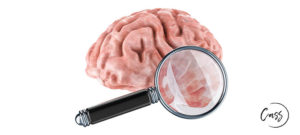
Sometimes no matter how much you try to convince yourself to put the Tim Tams back in the pantry, you just can’t help having another one.. and another and another. Overindulging in some delicious temptation is very human and while you probably want to curb the compulsive overeating, the occasional blowout won’t necessarily do a whole lot of harm. For some people though, those blowouts are all too frequent. If you feel out of control around food and are regularly eating a lot more food than is necessary or healthy, it can be every bit as harmful to your emotional and psychological wellbeing as your physical health.
For some people, it’s hard to know what falls into the category of normal ‘emotional eating’ or even mindless snacking and what would be considered a problem worth getting professional help to address. There are some clear guidelines about what a mental health professional would consider to be a binge eating disorder and they are outlined as follows:
Binge eating has two main components to it:
1. It involves eating a very large amount of food (far more than what would be considered a normal amount for a regular person) in a relatively short space of time (e.g., within two hours);
2. You experience a feeling of being out of control while eating. Perhaps you feel like you can’t stop eating or even that you ‘zone out’ and you’re not really present while you’re eating.
Some of the other criteria that signify that binge eating is potentially a clinical problem include the following (you don’t need to tick every box):
- Eating much more quickly than normal
- Eating until you feel uncomfortably full
- Eating large amounts of food when you’re not hungry
- Eating alone because you feel embarrassed or ashamed
- Feeling disgusted, depressed or guilty afterwards
In psychology, something becomes a ‘disorder’ when it occurs repeatedly over a period of time. In the case of binge eating, if this is happening at least once a week (on average) and has been going on for three months or more that would meet the clinical definition of a Binge Eating Disorder. Binge Eating is different from Bulimia Nervosa because there is no ‘compensatory’ behaviour such as vomiting, excessive exercising or taking laxatives.
What to do about it
You really don’t need to wait until the situation is completely out of hand before you get some advice from a professional about what you might be able to do differently. Usually the problem has nothing to do with food and is more about how you deal with difficult feelings, so any help you can get to learn more effective coping strategies is going to be helpful. Here are some things you might like to do to start with.
1. Keep a food diary
By tracking what you eat and when you eat it, what you were feeling before and after you binged, you start to get an insight into your triggers and patterns. You might be able to use this information to make changes to your routine or if you see a professional, the information will give you a really good starting point for unpacking the problem and dealing with it.
2. Eat more mindfully
When you’re mindful, you make a conscious choice to bring yourself fully into the present moment and pay attention to what you’re feeling in your mind and body. This is challenging if you’re used to stuffing down your feelings with food. By slowing down and being present with yourself and your feelings, you give yourself a chance to make a different choice in that moment. Even if you don’t stop yourself from compulsively reaching for food, you might stop eating sooner than you normally would and this is good progress when it comes to changing patterns.
3. Don’t be so hard on yourself
Most people get very down on themselves for overeating. If you use food as a way of coping with difficult feelings, and then you make yourself feel terrible by piling on the shame and self-criticism you’re only going to drive yourself back to overeating and so the cycle continues. What you need most is not self-criticism but self-compassion. Remind yourself that everyone struggles with something and that you’re worthy of love and support.
Ultimately, if you recognise that you have a problem with binge eating, I highly recommend you seek support from a kind and qualified professional who can help you identify your specific patterns and triggers and develop specific strategies to start breaking the cycle. Remember you aren’t alone and there are people who are very willing and able to help if you reach out to them for support.






